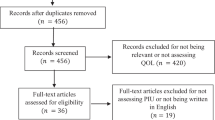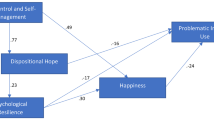Abstract
Literature shows that people who have experienced adverse experiences in childhood (ACE) have a low level of well-being and may be involved in risky behaviors, such as problematic use of technology. Also, those with a lower level of life satisfaction is associated with excessive use of the Internet and mobile phone. This study aimed to explore the relationship between ACE, life satisfaction and excessive use of technology (internet and smartphone). The study was conducted on Romanian population (n = 357), aged between 18 and 59 years (M = 22.42), university students (n = 286) and non-students (n = 71). PROCESS Macro model 4, was used to analyze the mediating role of satisfaction with life in the relationship between ACE and technology addiction. The results revealed an indirect effect of life satisfaction on problematic Internet (95% CI = .437–1.240), and mobile phone use (95% CI = .483–2.145). These indicate that at least some of this effect occurs through life satisfaction as mediating variable due to the significant indirect effect. Thus, people who experiences a high level of ACE will report a low level of satisfaction with life. Also, those with a low level of life satisfaction will report an excessive use of Internet and mobile phone. The results of this study bring extra knowledge and shed new light on the psychological aspects of the early traumatic events and contribute to the understanding of the way people relate to this experiences.


Similar content being viewed by others
Data Availability
The datasets generated during and/or analyzed during the current study are available in the OSF repository, https://osf.io/hx7pd/?view_only=40772fdf046349ee9576322a2ca16d5a.
References
Almuneef, M., Qayad, M., Aleissa, M., & Albuhairan, F. (2014). Adverse childhood experiences, chronic diseases, and risky health behaviors in Saudi Arabian adults: A pilot study. Child Abuse & Neglect, 38(11), 1787–1793. https://doi.org/10.1016/j.chiabu.2014.06.003
Baban, A., Cosma, A., Balazsi, R., Sethi, D., & Olsavszky, V. (2013). Survey of adverse childhood experiences among Romanian university students. Study Report from the 2012 Survey. (http://www.euro.who.int/pubrequest). World Health Organization.
Bernal-Ruiz, C., Rosa-Alcázar, A. I., González-Calatayud, V., & Rosa-Alcázar, E. (2017a). Is there a relationship between problematic internet use and responses of social anxiety, obsessive-compulsive and psychological well-being among adolescents? Anales de psicología, 33.
Bernal-Ruiz, C., Rosa-Alcázar, A. I., González-Calatayud, V., & Rosa-Alcázar, E. (2017b). ¿Existe relación entre uso problemático de Internet y las respuestas de ansiedad social, obsesivo-compulsivas y el bienestar psicológico en adolescentes? Anales de Psicología, 33(2), 269. https://doi.org/10.6018/analesps.33.2.265831
Bethell, C., Carle, A., Hudziak, J., et al. (2017). Methods to assess adverse childhood experiences of children and families: Towards approaches to promote child well-being in policy and practice. Academic Pediatrics, 17, S51–S69.
Bianchi, A., & Phillips, J. G. (2005). Psychological predictors of problem Mobile phone use. Cyberpsychology & Behavior, 8(1), 39–51. https://doi.org/10.1089/cpb.2005.8.39
Casale, S., Lecchi, S., & Fioravanti, G. (2015). The association between psychological well-being and problematic use of internet communicative services among young people. The Journal of Psychology: Interdisciplinary and Applied, 149, 480–497. https://doi.org/10.1080/00223980.2014.905432
Castellacci, F., & Tveito, V. (2018). Internet use and well-being: A survey and a theoretical framework. Research Policy, 47(1), 308–325. https://doi.org/10.1016/j.respol.2017.11.007
Colombo, E., Rotondi, V., & Stanca, L. (2017). Macroeconomic conditions and well-being: do social interactions matter? Applied Economics, 50(28), 3029–3038. https://doi.org/10.1080/00036846.2017.1414935.
Deci, E. L., & Ryan, R. M. (2000). The "what" and "why" of goal pursuits: Human needs and the self-determination of behavior. Psychological Inquiry, 11(4), 227–268. https://doi.org/10.1207/S15327965PLI1104_01
Diener, E., Emmons, R. A., Larsen, R. J., & Griffin, S. (1985). The satisfaction with life scale. Journal of Personality Assessment, 49, 71–75. https://doi.org/10.1207/s15327752jpa490113
Felitti, V. J., & Anda, R. F. (2010). The relationship of adverse childhood experiences to adult medical disease, psychiatric disorders and sexual behavior: Implications for healthcare. In R. Lanius & E. Vermetten (Eds.), The impact of early life trauma on health and disease: The hidden epidemic (pp. 77–87). Cambridge University Press.
Finkelhor, D. (2011). Prevalence of child victimization, abuse, crime, and violence exposure. In J. W. White, M. P. Koss, & A. E. Kazdin (Eds.), Violence against women and children: Mapping the terrain (pp. 9–29). American Psychological Association.
Gluckman, P. D., Hanson, M. A., Cooper, C., & Thornburg, K. L. (2008). Effect of In Utero and Early-Life Conditions on Adult Health and Disease. New England Journal of Medicine, 359(1), 61–73. https://doi.org/10.1056/nejmra0708473
Gooding, H. C., Milliren, C., Austin, S. B., Sheridan, M. A., & McLaughlin, K. A. (2015). Exposure to violence in childhood is associated with higher body mass index in adolescence. Child Abuse & Neglect, 50, 151–158. https://doi.org/10.1016/j.chiabu.2015.08.005
Hayes, A. F. (2018). Introduction to mediation, moderation, and conditional process analysis: a regression-based approach (Second ed.). The Guilford Press.
Hildyard, K. L., & Wolfe, D. A. (2002). Child neglect: developmental issues and outcomes. Child Abuse & Neglect, 26(6–7), 679–695. https://doi.org/10.1016/s0145-2134(02)00341-1
Hsieh, Y.-P., Shen, A., Wei, H.-S., Feng, J.-Y., Huang, S., & Hwa, H.-L. (2016). Associations between child maltreatment, PTSD, and internet addiction among Taiwanese students. Computers in Human Behavior, 56, 209e214.
Huebner, E. S., Suldo, S. M., & Gilman, R. (2006). Life Satisfaction. In G. G. Bear & K. M. Minke (Eds.), Children’s needs III: Development, prevention, and intervention (pp. 357–368). National Association of School Psychologists.
Hunt, T. K. A., Berger, L. M., & Slack, K. S. (2016). Adverse childhood experiences and behavioral problems in middle childhood. Child Abuse & Neglect, 67, 391–402. https://doi.org/10.1016/j.chiabu.2016.11.005
Iacono, L., Catale, C., Martini, A., Valzania, A., Viscomi, M. T., Chiurchiù, V., Guatteo, E., Bussone, S., Perrone, F., Di Sabato, P., Aricò, E., D’Argenio, A., Troisi, A., Mercuri, N. B., Maccarrone, M., Puglisi-Allegra, S., Casella, P., & Carola, V. (2018). From traumatic childhood to cocaine abuse: the critical function of the immune system. Biological Psychiatry. https://doi.org/10.1016/j.biopsych.2018.05.022
Jones, T. M., Nurius, P., Song, C., & Fleming, C. M. (2018). Modelling life course pathways from adverse childhood experiences to adult mental health. Child Abuse & Neglect, 80, 32–40.
Kumcagiz, H., & Gunduz, Y. (2016). Relationship between Psychological Well-Being and Smartphone Addiction of University Students. International Journal of Higher Education, 5(4). https://doi.org/10.5430/ijhe.v5n4p144
Lachmann, B., Sindermann, C., Sariyska, R. Y., Luo, R., Melchers, M. C., Becker, B., & Montag, C. (2018). The role of empathy and life satisfaction in internet and smartphone use disorder. Frontiers in Psychology, 9. https://doi.org/10.3389/fpsyg.2018.00398.
Lambru, I., Butucescu, A., & Usc¯atescu, L., Constantinescu, P.-M., Sandu, G., & Stevens, M. J. (2012). Romanian adaptation of the Satisfaction With Life Scale. Journal of Psychological and Educational Research, 1, 17–33.
Leung, L. (2007). Stressful Life Events, Motives for Internet Use, and Social Support Among Digital Kids. CyberPsychology & Behavior, 10(2), 204–214. https://doi.org/10.1089/cpb.2006.9967
Li, D., Zhang, W., Li, X., Zhen, S., & Wang, Y. (2010). Stressful life events and problematic Internet use by adolescent females and males: A mediated moderation model q. Computers in Human Behavior, 26, 1199–1207.
Li, D., Zhang, W., Li, X., Zhou, Y., Zhao, L., & Wang, Y. (2016). Stressful life events and adolescent Internet addiction: The mediating role of psychological needs satisfaction and the moderating role of coping style. Computers in Human Behavior, 63, 408–415. https://doi.org/10.1016/j.chb.2016.05.070
Longstreet, P., & Brooks, S. (2017). Life satisfaction: A key to managing internet & social media addiction. Technology in Society. https://doi.org/10.1016/j.techsoc.2017.05.003
Lovallo, W. R., Farag, N. H., Sorocco, K. H., Acheson, A., Cohoon, A. J., & Vincent, A. S. (2013). Early life adversity contributes to impaired cognition and impulsive behavior: Studies from the Oklahoma Family Health Patterns Project. Alcoholism: Clinical and Experimental Research, 37(4), 616–623.
Mersky, J. P., Topitzes, J., & Reynolds, A. J. (2013). Impacts of adverse childhood experiences on health, mental health, and substance use in early adulthood: A cohort study of an urban, minority sample in the U.S. Child Abuse and Neglect 37(11), 917–925. https://doi.org/10.1016/j.chiabu.2013.07.011
Midei, A. J., & Matthews, K. A. (2011). Interpersonal violence in childhood as a risk factor for obesity: A systematic review of the literature and proposed pathways. Obesity Reviews, 12(5), e159–e172.
Mosley-Johnson, E., Garacci, E., Wagner, N., Mendez, C., Williams, J. S., & Egede, L. E. (2019). Assessing the relationship between adverse childhood experiences and life satisfaction, psychological well-being, and social well-being: United States Longitudinal Cohort 1995–2014. Quality of Life Research. https://doi.org/10.1007/s11136-018-2054-6
Norman, R. E., Byambaa, M., De, R., Butchart, A., Scott, J., & Vos, T. (2012). The Long-Term Health Consequences of Child Physical Abuse, Emotional Abuse, and Neglect: A Systematic Review and Meta-Analysis. PLoS Medicine, 9(11), e1001349. https://doi.org/10.1371/journal.pmed.1001349
Nurius, P. S., Green, S., Logan-Greene, P., Longhi, D., & Song, C. (2016). Stress pathways to health inequalities: Embedding ACEs within social and behavioral contexts. International Public Health Journal, 8(2), 241–256.
Ouyang, Z., Wang, Y., & Yu, H. (2016). Internet Use in Young Adult Males: from the Perspective of Pursuing Well-Being. Current Psychology, 36(4), 840–848. https://doi.org/10.1007/s12144-016-9473-8
Ramiro, L. S., Madrid, B. J., & Brown, D. W. (2010). Adverse childhood experiences (ACE) and health-risk behaviors among adults in a developing country setting. Child Abuse & Neglect, 34(11), 842–855. https://doi.org/10.1016/j.chiabu.2010.02.012
Schilling, E. A., Aseltine, R. H., & Gore, S. (2007). Adverse childhood experiences and mental health in young adults: a longitudinal survey. BMC Public Health, 7(1). https://doi.org/10.1186/1471-2458-7-30
Schimmenti, A., Passanisi, A., Caretti, V., La Marca, L., Granieri, A., Iacolino, C., et al. (2017). Traumatic experiences, alexithymia, and Internet addiction symptoms among late adolescents: A moderated mediation analysis. Addictive Behaviors, 64, 314–320. https://doi.org/10.1016/j.addbeh.2015.11.002
Seo, J., Lee, C. S., Lee, Y. J., Lee, M. S., Bhang, S. Y., & Lee, D. (2020). The mediating effect of depressive symptoms on the relationship between adverse childhood experiences and problematic internet Use in children and adolescents. Journal of Korean Medical Science, 35(31), 7–11. https://doi.org/10.3346/JKMS.2020.35.E282
Tudorel, O. I., & Vintilă, M. (2018). The role of Social Support on Internet Addiction. Revista de Asistență Socială, 1, 73–78.
Tudorel, O. I., Vintila, M., Vlaicu, L., Balauta, D., Goian, C., & Rusu, A. (2018). Romanian version of the Internet Addiction Test: Psychometric properties and cross-gender invariance. International Journal of Mental Health and Addiction. https://doi.org/10.1007/s11469-018-0014-6
Vintila, M., Tudorel, O. I., Goian, C., & Barbat, C. (2018). Determining the structure of Smartphone Addiction Scale: A bifactor model analysis. Current Psychology. https://doi.org/10.1007/s12144-018-0035-0
Wang, E. S., & Wang, M. C. (2013). Social support and social interaction ties on Internet addiction: Integrating online and offline contexts. Cyberpsychology, Behavior, And Social Networking, 16(11), 843–849. https://doi.org/10.1089/cyber.2012.0557
World Health Organization (2018). Adverse Childhood Experiences International Questionnaire. In Adverse Childhood Experiences International Questionnaire (ACE-IQ). [website]: Geneva: WHO. http://www.who.int/violence_injury_prevention/violence/activities/ adverse_childhood_experiences/en;
Yates, T. M., Gregor, M. A., & Haviland, M. G. (2012). Child Maltreatment, Alexithymia, and Problematic Internet Use in Young Adulthood. Cyberpsychology, Behavior, and Social Networking, 15(4), 219–225. https://doi.org/10.1089/cyber.2011.0427
Yen, J.-Y., Yen, C.-F., Chen, C.-C., Chen, S.-H., & Ko, C.-H. (2007). Family Factors of Internet Addiction and Substance Use Experience in Taiwanese Adolescents. CyberPsychology & Behavior, 10(3), 323–329. https://doi.org/10.1089/cpb.2006.9948
Young, K. S. (1998). Internet addiction: The emergence of a new clinical disorder. CyberPsychology and Behavior, 1(3), 237–244. https://doi.org/10.1089/cpb.1998.1.237
Zillmann, D. (1988). Mood management: using entertainment to full advantage. In L. Donohew, H. E. Sypher, & E. T. Higgins (Eds.), Communication social cognition, and effect (pp. 147–171). Lawrence Erlbaum.
Funding
The authors received no specific funding for this work.
Author information
Authors and Affiliations
Corresponding author
Ethics declarations
Conflict of Interest
On behalf of all authors, the corresponding author states that there is no conflict of interest.
Ethical Approval
All procedures performed in studies involving human participants were in accordance with the ethical standards of the institutional and/or national research committee and with the 1964 Helsinki declaration and its later amendments or comparable ethical standards.
Informed Consent
Informed consent was obtained from all individual participants included in the study.
Additional information
Publisher’s Note
Springer Nature remains neutral with regard to jurisdictional claims in published maps and institutional affiliations.
Rights and permissions
About this article
Cite this article
Tudorel, O.I. Adverse childhood experiences and problematic technology use: The mediating role of satisfaction with life. Curr Psychol 42, 14681–14688 (2023). https://doi.org/10.1007/s12144-022-02723-w
Accepted:
Published:
Issue Date:
DOI: https://doi.org/10.1007/s12144-022-02723-w




